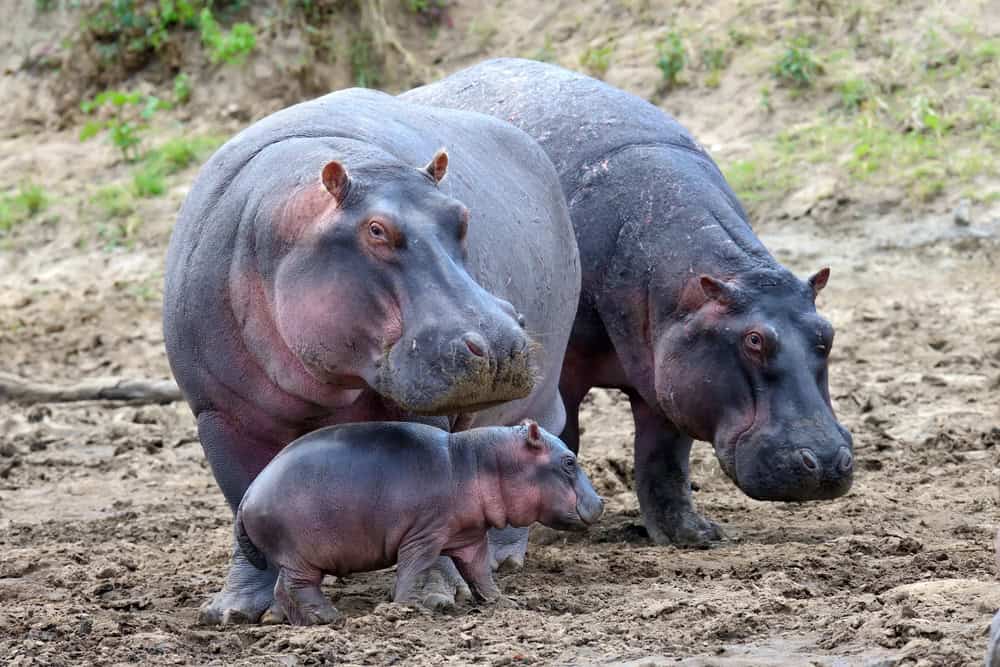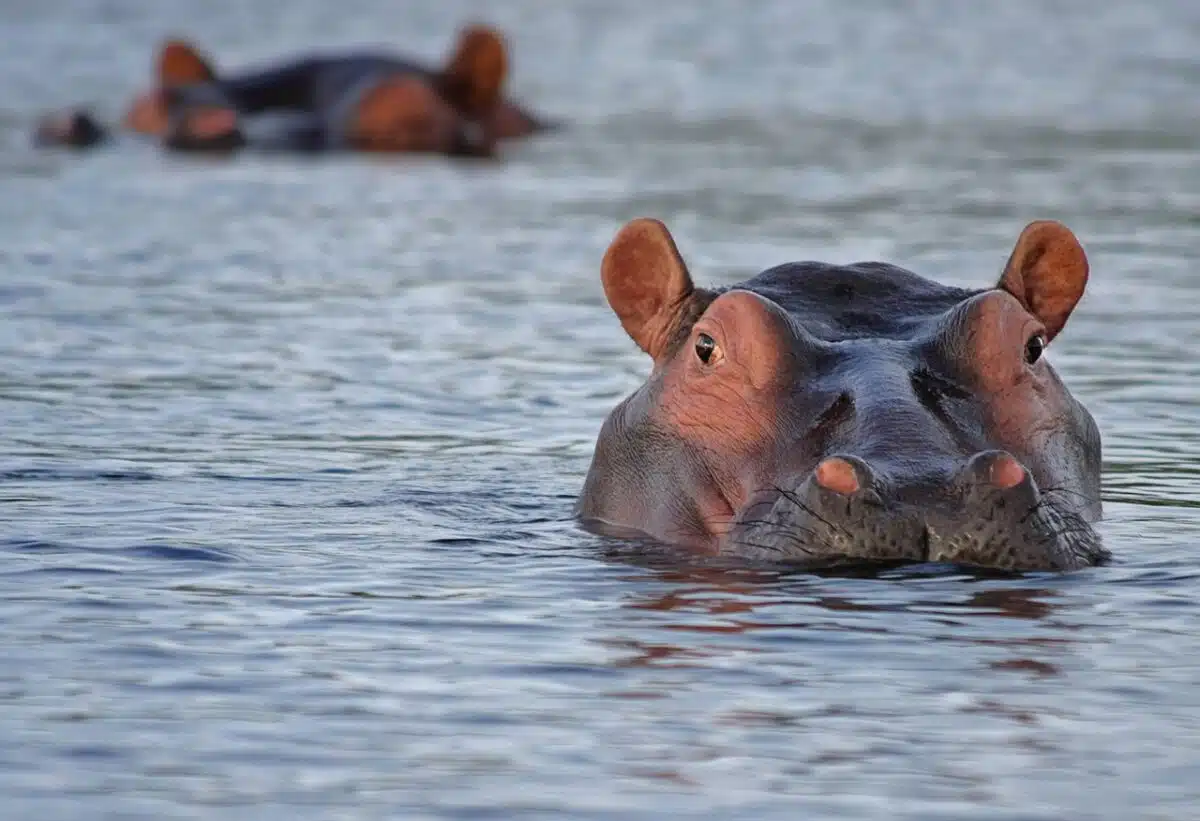Hippos are amazing animals. Their large size and semi-aquatic lifestyle make them one of the most recognizable animals in Africa. However did you know that hippos are incapable of swimming? Although it may come as a surprise, it is the case. Now let’s get specific.
The Misconception About Hippos

Most people think hippos are great swimmers. After all they spend a lot of time in the water. However, the truth is they don’t swim at all. Instead, they move by walking or running along the bottom of rivers and lakes. Their massive bodies are too dense to float, so they keep themselves submerged by pushing off the ground.
How Hippos Move in Water

Hippos are very buoyant, despite their size. They use their legs to propel themselves in a way that looks like swimming. They push off from the riverbed and glide through the water.
Anti-Gravity Leaps

When they need to rise for air, they just push off the bottom and float to the surface. Moreover this movement is efficient and allows them to stay underwater for up to five minutes.
Why Hippos Spend Time in Water

Hydration is essential for hippos. It keeps them cool in the sweltering African sun. They must always have moisture on them because their skin is delicate and dries out easily. Water offers defense as well.
Water Advantages

Being mostly submerged hides them from predators and keeps them safe. Plus it supports their heavy bodies, making movement easier and less taxing on their joints.
The Importance of Waterways

Generally hippos are found in rivers, lakes and swamps. These water sources are their lifeline. They provide a habitat but also food. Hippos graze on grasses close to water and come out at night to feed. During the day they stay in the water, resting and keeping cool. Evidently this balance is essential for their survival.
Wrapping Up with Did You Know Hippos Can’t Swim?

Hippos are unique in many ways. Their inability to swim does not hinder their aquatic lifestyle. Instead, they have adapted perfectly to their water-bound environment.
Next time you see a hippo in the water, remember it’s not swimming—it’s walking underwater. This fascinating fact adds to the many wonders of these incredible animals.
How Do Hippos Spend Their Day?

Hippos spend most of their day in the water to keep cool. They stay submerged to avoid the sun. At night, they leave the water to graze on grasses. Their daily routine is simple and repetitive.
Why Are Hippos Considered Dangerous?

Despite their calm appearance, hippos are very territorial and can be aggressive. They have powerful jaws and sharp teeth. They can easily outrun a human on land. This makes them one of the most dangerous animals in Africa.
How Do Hippos Communicate?

Hippos communicate through grunts, bellows, and wheezes. They also use body language, such as yawning to display their large teeth as a threat. Their communication is essential for maintaining social bonds and asserting dominance.
What Do Hippos Eat?

Hippos are primarily herbivores. They mainly eat grass, consuming up to 150 pounds a night. Occasionally, they may eat fruit or other vegetation. They graze at night to avoid the heat of the day.
How Long Do Hippos Live?

Hippos in the wild live around 40 to 50 years. In captivity, they can live slightly longer due to regular food supply and medical care. Their lifespan depends on environmental conditions and threats.
How Do Hippos Care for Their Young?

Female hippos give birth in the water and keep their calves there for protection. Calves can swim immediately and stay close to their mothers. The mother nurses her calf for about eight months.
Why Do Hippos Yawn?

Hippos yawn to show their large teeth and assert dominance. It is a sign of aggression or threat display to other hippos or intruders. The yawning helps to maintain social order within the group.
Can Hippos Swim?

Despite their aquatic lifestyle, hippos do not swim. They walk or run along the bottom of rivers and lakes. Their buoyant bodies allow them to move effortlessly in water, but they stay mostly submerged.
What Is a Group of Hippos Called?

A group of hippos is called a bloat. They are social animals and live in groups for protection and social interaction. The size of a bloat can vary, usually consisting of around 10 to 20 individuals.
How Fast Can Hippos Run?

Hippos can run up to 20 miles per hour on land. Despite their bulky size, they are surprisingly fast and agile. They can outrun most humans, making them dangerous when threatened or provoked.
Do Hippos Have Natural Predators?

Adult hippos have few natural predators due to their size and strength. However, young hippos can fall prey to lions, crocodiles, and hyenas. Human activity also poses a significant threat to hippos through habitat loss and poaching.
How Do Hippos Mark Their Territory?

Hippos mark their territory by spreading their dung. They use their tails to scatter feces around, creating boundaries. This behavior helps to communicate presence and reduce conflicts with other hippos.
Why Do Hippos Have Pink Sweat?

Hippos secrete a reddish oily fluid often called “blood sweat.” It is not actually sweat but acts as a skin moisturizer and sunblock. The secretion also has antibacterial properties to protect against infections.
Next up ~
- Watch: Hippo Chases A Speedboat And Surprises Everyone With A Close Encounter
- Hippos Help Duckling Reunite With Mom
Join our Forum for free today!

- Tiger Chained Up Her Whole Life Takes Her First Free Steps - June 26, 2024
- Eagle Daringly Snatches Baby Crocodile from Mother’s Watchful Eyes! - June 25, 2024
- Young Children Watching Massive Wild Elk Only 5ft Away In Grand Canyon - June 25, 2024

